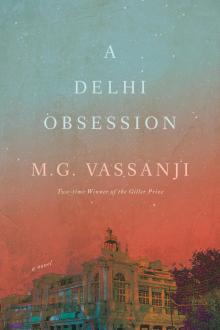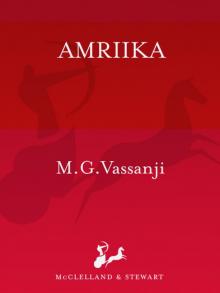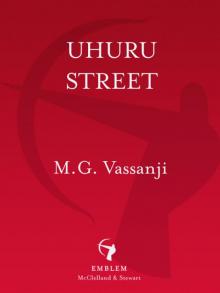- Home
- M G Vassanji
The Gunny Sack Page 3
The Gunny Sack Read online
Page 3
The lion of Matamu was admitted home nervous and trembling. “They are after me,” he said. “The Mdachis.”
“And what did you do that the Germans are after you?”
“I was watching the Maji Maji with my friends.”
Dhanji Govindji hastened his son inside and tried to abate Fatima’s fury.
“So,” began Dhanji Govindji. “What was it like, this Maji Maji?”
“It’s like they say. The men, and even women, were drinking from gourds. Then they put leaves on their heads and began chanting. We joined them. All those who were hiding in the bushes came to join. ‘Maji maji maji maji,’ we were shouting. ‘The Mdachis? Kill them! The Mdachis? Spear them, spear them!’ Then the Mdachis came with their askaris. They began shooting peu, peu, and some men fell. Then all started running, scattering everywhere, and the Mdachis started shooting with this gun that throws bullets like water—pye-pye-pye-pye-pye, like this, and aiii, many fell. Many will hang, I tell you. Guu Refu was there.”
Dhanji Govindji looked at his son. “And do you think it is right that for the sake of your games and to show your cleverness you endanger the lives of these children? And the water on your back, you think that’s the German bullets turned to water, do you? You fool, if a bullet had touched you, you would be meat for the hyenas.”
Huseni looked hurt. He was hidden for three days in the loft in the store, behind gunnies of produce. The next morning the Germans made a show of strength in Matamu and nearby areas, appearing with their askaris, and the villagers had their look at the notorious Nubians. Thus the Maji Maji revolt, which spread like a bush fire in the night across more than a quarter of the country, bypassed Matamu.
One day when Gulam, the other son, was fourteen he was sent to neighbouring Kitmangau on an errand. He came back on a stretcher carried by two Mshenzis from a nearby village. He had been attacked on the way, and the servant who accompanied him had run away. The first people to see the stretcher come in were Huseni and his gang under the tree.
“Wey! Who is sick?” shouted Huseni to the bearers.
“Bwana Dhanji’s son has been attacked by bandits,” came the obsequious reply.
“Move-move-move, pisha!” cried the half-caste, up on his feet, pushing aside the bearers. “I am also his son. Do you think I’ll simply sit while you carry my brother home?”
To this incident is traced the first transformation of my grandfather Huseni. The Maji Maji incident had already sobered him somewhat. Now he saw himself as the oldest son, the protector of Fatima’s children. So complete did his transformation seem, and so great was Dhanji Govindji’s relief, that to make sure the boy did not revert to his old ways he took a proposal of marriage to a local family who had in their home a girl who was of age.
My grandmother was an orphan of fifteen and the proposal was quickly accepted. Her name was Moti, pearl, and she was the first jewel in Dhanji Govindji’s life. The other was Ji Bai.
Ji Bai’s actual name was Mongi, precious. She was called Ji Bai because to every command from her father she promptly answered, “Ji, ha,” yes, sir. If her mother or father called her—Mongiiiii!—or whenever anyone else called her—Eh, Mongi!—promptly would come the reply, “Ji!” Such politeness in a child, so often desired, so rarely fulfilled! Ji Bai was the darling of Bajupur.
In Bajupur, Ji Bai at thirteen liked to play bandits. Like many girls of her age she had no plans for getting married, but imagined herself always in her father’s village. One day, she and her friends went to the local Brahmin to have their palms read. “I see a successful marriage in this hand,” droned the pandit, holding her hand, “you will be married to a second-timer, and your hand shows many-many children …”
“Go, go,” said Ji Bai, pulling back her hand. “You have teeth in your head. Like this I will marry a second-timer.” She showed him a derisive thumb and skipped away.
“Remember,” called out the pandit, with a red, liquidy paan-filled grin, holding up his forefinger, “many-many children …”
She woke up one day two months later to the sounds and smells of a wedding in preparation. The air was laden with the sweet, rich smells of hot ghee and saffron, cloves and cinnamon, as the mithai-makers got under way. In a compound outside her father’s house women were cleaning the rice and pulse was being pounded. And the most tell-tale sign of all: the women, all women, had on their lips the joyful, teasing songs of marriage. Her mother and father were not to be seen. She went to her sister-in-law and asked, “Aré, Bhabhi, whose wedding is this?” And the bright-eyed Bhabhi looked up, joyfully teasing, “Oh, my! Haven’t you heard? Yours!”
Ji Bai found that it was three days since she had been formally engaged. A troupe of men had come to their house with the mukhi and taken away her father’s consent in a register. Now a whole section of Bajupur was closed off to her because that was where the groom’s party had camped.
That was the first time she remembered saying “Na” to her father.
The boy was Gulam, sent to Junapur by his father in the company of Ragavji Devraj, when his first wife from Kitmangau died three months after the wedding. The girl Mongi was sighted playing with her friends as they stopped over on their way inland from Porbander. Enquiries were made, and two weeks later Ragavji Devraj returned with the boy and the proposal.
For her remaining days in the village Ji Bai sent constant word to her father to change his mind.
“Are you crazy?” came the reply. “Do you want me to break my word?”
For those remaining days, as the village celebrated her supposed joy, she wept alone in a dark room and refused to touch food. On the last day, the day of the wedding, her father came to see her.
“What is it, my grandmother?” For she was, to him, his own grandmother returned.
“Where are you sending me, Bapa?” she cried. “Where is Africa? I know no-one in those parts, I’ll never see you again.”
“I am your father, na? Trust me,” he said, patting her head. “You’ll never be unhappy. Now be good and make me proud.” He embraced her and she relented.
One last gesture of love for her father, one last gift to make him happy. For truly she would never see him again. She sat on his lap, and from the plate he had brought with him he fed his darling daughter with his hands as he gave her advice on conduct.
“Don’t let me down, Ji Bai. Do nothing to bring shame upon yourself. Never walk out alone. Don’t speak of your home outside the four walls. Always cover your family’s shame. Don’t come back without your husband’s permission …” And he bade the female members of the family to come and bathe the bride, to anoint her with saffron, to await the puro, the procession of singing females of the opposite side bringing in the bridal clothes and henna.
So the pandit’s prophecy came true. And Mongi overnight became a woman. She came to Africa with her husband in a steamer. Disembarking in Dar es Salaam, the two respectfully touched the feet of Dhanji Govindji and his wife who had come to meet them.
By this time the Indians of Matamu and neighbouring towns had acquired a sheth in Dar es Salaam, their agent Karmali Samji, who bought their produce and supplied them with goods. Karmali Samji’s dhows plied the sea between Dar es Salaam and Kilwa; his team of porters went a hundred miles into the interior along the old caravan route. Zanzibar, which had ruled the coast for centuries, finally lost its grip on the mainland. Amarsi Makan’s millions had been squandered, as were Jairam Shivji’s and Ladha Damji’s. In their place, new “uncrowned kings” of business were setting up along the coast from Kilwa to Mombasa, with empires stretching all the way up to Kampala in the interior.
Ji Bai and Gulam stayed a month in the newly-constructed rest house of Dar es Salaam, after which they travelled in one of Sheth Karmali Samji’s dhows to Matamu. The dhow anchored in shallow water, and Ji Bai was carried ashore on the back of an African as Gulam followed with rolled trousers, instructing the porters. They were welcomed by a band playing an Indian wedding tune on reed flutes, an
d the procession left for Dhanji Govindji’s shop, stopping at the mosque on the way, for the bride and groom to bow their thanks. As they crossed the threshold of their home a shower of rice grain greeted them, waiting women broke into a geet, and the crunch of clay saucers under their feet wished them good luck.
One of her first acts when she reached Matamu, Ji Bai would say, was to engage in a childish squabble with one of Fatima’s children. Growing up in such a short time was not easy.
With two jewels in his breast, Dhanji Govindji’s luck seemed to have blossomed. What past acts come now to reward me like this? he would say with a satisfied sigh. The sounds of their pleasant voices, their laughter, their singing and games rang joyfully through the house and filled him with pleasure. Like all respectable women they did not meet his eyes, of course, and they hid their faces behind their pachedis. Nevertheless there grew a communication between them, an understanding. Whenever their laughter and singing desisted for long, when prolonged silences were punctuated by mutterings and whispers and sighs, he would call Fatima and ask what was the matter. Instantly matters would return to normal. In turn the two girls pampered him. When he praised some food one of them had prepared, it would be repeated after a suitable interval. A severe mood on his part would be placated by a favourite sweet, a mithai. A more lax atmosphere was taken advantage of by more extravagance. He was like a god to them, whom they daily propitiated, whose attributes they sang to each other, whose idiosyncracies gave them joy to recall.
A few months after she arrived, Ji Bai, pushing aside the gunny curtain, entered the outhouse late one night before going to bed. Her kerosene lamp, raised in front of her, revealed a black face, wide-eyed, frightened and looking drunk. Herself frightened out of her wits, she asked, “What do you want?” Back came an incoherent reply. There was a rustle in the shadows, and when she raised the lamp higher she saw two more men.
“We’re hiding from the Mdachis,” a voice said. “Don’t call out.”
Here Ji Bai used the wits she had left with the sense of humour she never lost. “Well, I have a need,” she spoke with determination.
“It’s all right, mama,” came the unruffled reply. “We can’t see in the dark.” A man came and took the lamp away, lowered the wick, and left it burning in a corner, and Ji Bai sat on the pit and relieved herself in the darkness.
When a man hides inside a house, the first place to look for him is the lavatory. Dhanji Govindji, presented with the fait accompli, hid the three men in his loft inside the store. The next morning Guu Refu’s head was found on a pole on the road leading to his farm. Askaris appeared and began combing the area, but Indian shops were spared. Mzee Guaro came with the message, “The Mdachi commander requests that you check your lavatories at night.” The three men left at dusk, pretending to be three grateful customers, just before Dhanji Govindji closed for the day and went to pray. Ji Bai never knew if the men later hanged for the crime were any of these.
Dhanji Govindji and Sons, said the new sign outside the shop. Business was flourishing. But then, with two Lakshmis resident in his home, what else could he expect? His two eldest sons were in harness, and there seemed no danger of them breaking loose. Moti gave birth to a boy, who was born on a Friday and thus called Juma. Ji Bai’s son was born six months later and named Husein. With increased wealth and family came respect and influence. His unwitting deed in hiding three men from the Germans was known about and hinted at in respectable and prudent Swahili company, although he wished it were forgotten, lest inquisitive German ears came to know about it and destroy all he had built up. The pinnacle of Dhanji Govindji’s success came when he was made mukhi of Matamu after Ragavji Devraj retired.
It is not good to be too happy, anyone can tell you, just as it is not good to be too beautiful or handsome. Children who laugh too much go to bed crying, and it is always prudent to administer the bitter with the sweet. The jealous, evil eye lurks not very far off.
Ji Bai said that it was exactly during this happy interlude that Fatima’s mother, the Zanzibari widow, showed up to visit her daughter. Mother and daughter held long huddled talks. Mother and husband did not speak. Things were never the same again.
A few weeks after the widow left, Moti, hidden behind a veil, had a long chat with her father-in-law. That night Dhanji Govindji summoned Huseni. “Why were you not at the mosque today?” he asked. “I was visiting,” was the reply. “You have been seeing Bibi Taratibu behind my back, you have been consorting with the Mshenzis again.” There was no answer. “You fool,” said the father in uncontrolled rage, “you are descended from the Solar Race! What do you have to consort with slaves for?”
The sullen Huseni, eyes red, shifted on his feet. He raised his head.
Then he simply spat at his father’s feet and walked out. He never returned, he was never heard from again. There were reports that he had become a bandit, that he had gone to Zanzibar, that he had stowed away on a ship to Bombay. But nothing was confirmed. Every time he welcomed a traveller into his shop, or bid one goodbye, or wrote a letter, Dhanji Govindji would sense a message from the restless Moti. Ask. Please ask. Enquire about him. Discomfited, sad, remorseful, he would begin: “Ah, yes. I would like to enquire about my son, a big black man with a large, round head, tall like a tower, like Bhima in strength. If you have seen him or hear of someone like him …”
Moti was always a little fickle; but she waited two years for her man. Then she asked for permission to remarry.
Moti and Mongi, the two jewels in the house. One lost its place and fell. It is her turn to cook today and she returns from the market holding Juma by the hand. Baruti the servant walks behind with a basket of produce on his shoulder. The shop of Nanji Kara and Sons comes up and son Rajan in white singlet and red loincloth leans out to spit. Aaaahk!-thuck! She draws her veil shyly and averts her eyes, too late. Eye has met eye, and heart found heart. She walks on with thudding heart and he draws back, but the old woman his mother, sitting on the doorstep, feet planted solidly on the street, making paan in her lap, sees all and remains quiet.
Some days later Nanji Kara and wife and eldest daughter-in-law came with the proposal.
“What widow?” cried Dhanji Govindji in anger. “Henh? What widow, there are no widows here. What, you have already buried him, you have said the rites for him? I don’t remember.”
“But Mukhi,” said the dutiful bahu, and here came the barb, “how long will you keep another’s daughter in your home against her will?”
Mukhi Dhanji Govindji, who had not seen deep enough into Moti’s heart, fell into the trap. “Of course, it is up to her. I will ask her. That is all I can do.”
“That is all we ask for,” said Nanji Kara. “The girl has no parents.” And the troupe stepped out.
Dhanji Govindji quickly went inside to reassure his daughter-in-law. “Moti,” he said. “Moti, no one asks you to go. This is your home. You are my daughter. We will look after you and your son. The matter is closed.” He patted her head.
“Bapa, I would like to accept, with your permission,” she said, still looking down.
“Well, if this is your wish—”
That night he pleaded with her, he begged her not to go. But Moti was adamant.
First Moti had to be declared a widow. A witness was quickly found who claimed to have seen Huseni hanged. Then as mukhi, Dhanji Govindji gave his daughter-in-law in marriage to Rajan Nanji Kara. Rajan and Moti left the next day for Voi in Kenya. “The British have built a railroad,” said the elder Nanji Kara, “and business is booming there.”
“I had two eyes once,” Dhanji Govindji would say wistfully until the day he died. “Now I have only one.”
Tell me, you who would know all … What was she like, this gentle one, this Bibi Taratibu given to my ancestor for comfort on lonely, breezy African nights when mango and coconut trees rustled and crickets chirped and the roaring ocean echoed with reminders of a distant homeland? From what ravaged tribe, gutted village, was she brought to
the coast, and did she not also think of her home, her slaughtered father and uncles, her brothers and sisters also taken away …
She demurs, my gunny sack. Slave women, she says, wore a colourful cloth round their bodies, under the shoulders. She must have been dark dark, because she came from the interior. And technically she was not a slave, because the British Government of India had forbidden its subjects to keep slaves. Other than that? Surely there must have been something between this slave woman and her son Huseni, for he kept on seeing her against his father’s wishes, against respectability. Did she know where he went? Did Dhanji Govindji seek her help? No, most likely he had her house watched.
One day she too left Matamu and was never heard from again.
AS STRONG AS BHIMA.
They were the days of magic and spells. Of Bantu medicines, Arab djinns and Indian bhuts … you could find them all on trees, in graveyards, or under one roof running their nocturnal rounds, doing good or evil at their masters’ bidding … It is still a world of magic and spells. Everyone remembers that afternoon, a few years ago, when African Stars played Young Albion at Dar’s Illala Stadium. An old, undernourished white cock left the sidestands at half time and ambled to the edge of the field, waited uncertainly like an old veteran at a road crossing, then began to cross it, to the tumultuous encouraging roars of one side and hopeless finger-wagging pleas by the other. “Jamani …” said the announcer on radio. “Jamani!” screamed the announcer, the pitch in his voice rising to a fever … “kuna ajabu linatokelea hapo!” There’s a wonder at work here. The following day the Albion players anxiously searched the alleys of Dar for medicine that would reverse the jinx. The verdict? Change the name. Thus was born the Azania Football Club of Dar es Salaam.
And now … even here … this gaping hole in the gunny that has me mesmerized, this brown pouch that holds me spellbound, holed away in a basement listening to endless tales … Ji Bai was not innocent of magic and spells, and I realize that I sit here obedient to her charm, watched over by this watchdog Shehrbanoo of the gaping mouth, who holds many secrets …

 What You Are
What You Are A Delhi Obsession
A Delhi Obsession When She Was Queen
When She Was Queen No New Land
No New Land Nostalgia
Nostalgia Mordecai Richler
Mordecai Richler The Book of Secrets
The Book of Secrets Amriika
Amriika Uhuru Street
Uhuru Street And Home Was Kariakoo
And Home Was Kariakoo A Place Within
A Place Within The In-Between World of Vikram Lall
The In-Between World of Vikram Lall The Gunny Sack
The Gunny Sack